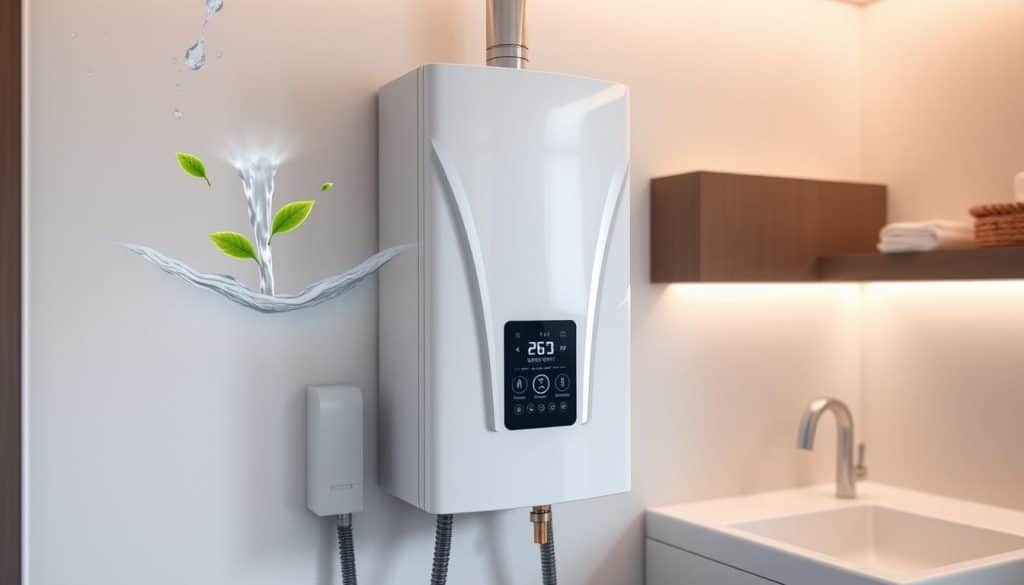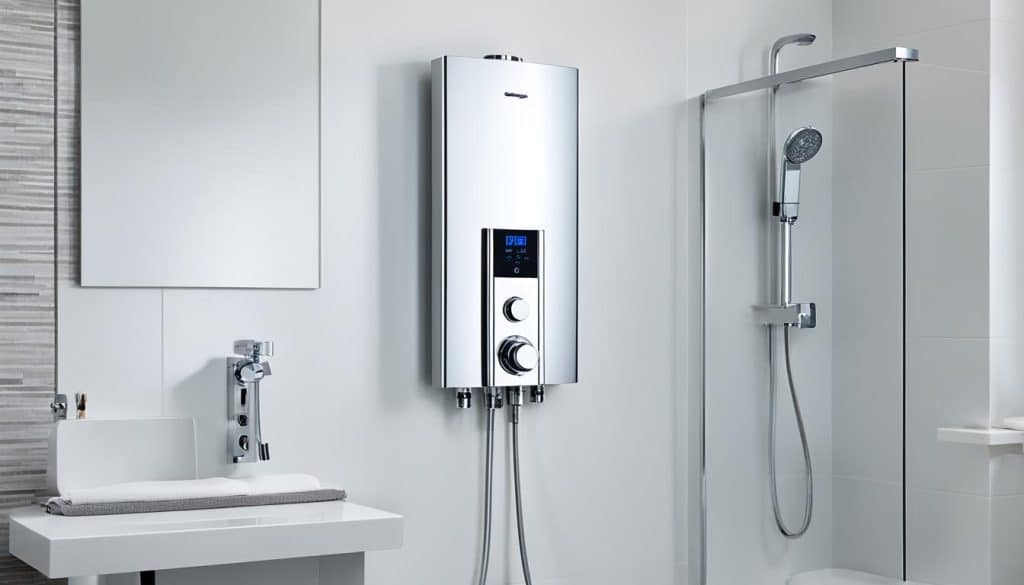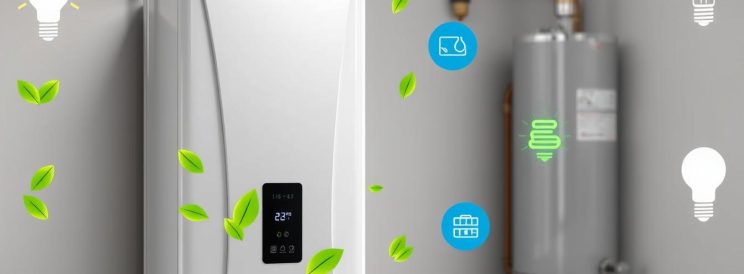Are you fed up with high energy bills? Wondering How Energy-Efficient is a Tankless Water Heater Compared to a Traditional One? Many people are looking for ways to save energy and money. They’re considering switching to a tankless water heater.
This article will dive into how tankless water heaters compare to traditional ones. Let J Sewer & Drain Plumbing Inc. take a look at what energy use, costs, and how much you could save. Our goal is to give you all the info you need to choose the best water heating option for your home.
Key Takeaways
- Understanding the energy consumption differences between tankless and traditional water heaters.
- Identifying potential energy savings with tankless water heaters.
- Comparing the cost-effective water heating solutions available today.
- Recognizing the environmental impact of your water heating choice.
- Weighing the long-term benefits of each system to make the best choice for your household.
Understanding Traditional Water Heaters
Traditional water heaters, also known as storage tank water heaters, are common in American homes. They store and heat a lot of water in a big tank, ready to use anytime. Knowing how they work and their pros and cons is key to making a good choice.
What is a Traditional Water Heater?
A traditional water heater has a big, insulated tank that holds 20 to 80 gallons of water. It has a heating system, either electric or gas, to keep the water hot. The heater keeps heating and re-heating the water, so hot water is always ready.
Benefits of Traditional Water Heaters
Traditional water heaters are simple and easy to install. They are reliable and easy to maintain. Plus, they are often cheaper upfront than tankless models, making them a good choice for many.
Drawbacks of Traditional Water Heaters
Despite their benefits, traditional water heaters have downsides. They use energy all the time, which can raise your bills. They also need a lot of space for the tank and need more maintenance.
Understanding Tankless Water Heaters
Tankless water heaters, also known as on-demand water heaters, provide hot water only as it is needed. They eliminate the need for a storage tank. These innovative devices heat water directly without using a storage tank for efficiency and convenience.
What is a Tankless Water Heater?
A tankless water heater works by heating water only when there is a demand for it. When a hot water tap is turned on, cold water travels through a pipe into the unit. There, either a gas burner or an electric element heats the water.
As a result, tankless water heater performance is immediate and efficient. They supply a constant flow of hot water.

Benefits of Tankless Water Heaters
There are many tankless water heater benefits. They provide an endless supply of hot water, which is great for larger households. Their compact, wall-mounted design saves valuable space, making them an eco-friendly option.
Additionally, they generally have a longer lifespan than traditional water heaters. This enhances their cost-efficiency and sustainability.
Drawbacks of Tankless Water Heaters
Despite the many advantages, there are some drawbacks. The initial installation cost is higher than that of traditional water heaters. In some cases, users may experience a slight delay in receiving hot water, known as the “cold water sandwich” effect.
Larger households may need multiple units to meet extensive hot water demands. This can further elevate costs and complexity.
How energy-efficient is a tankless water heater compared to a traditional one?
Choosing between a traditional water heater and a tankless model can greatly affect your energy use. This choice is key for making your home more energy-efficient.
Energy Consumption and Efficiency
Tankless water heaters only heat water when you need it. This means they don’t waste energy keeping water hot all the time. This is a big reason why they are tankless water heater efficiency champions. They can save up to 34% for those who use less hot water and about 14% for those who use more.
Traditional water heaters, however, always keep a tank of water hot. This leads to energy loss when the water isn’t being used. Even with improvements, they can’t match the energy-saving of tankless systems.
Cost Savings Over Time
Switching to a tankless water heater can save you money in the long run. They use less energy, which means lower bills. Plus, they last longer than traditional models, often up to 20 years. This makes them a smart choice for those who care about saving energy.
Environmental Impacts
The environmental effects of water heaters are significant. Tankless systems are better for the planet because they use less energy. They help reduce your carbon footprint and support eco-friendly living.
Adding energy-efficient home upgrades like a tankless water heater is good for your wallet and the planet. It helps save energy and cut down on emissions.
Assessing Installation and Maintenance Requirements
Choosing a water heater means looking at installation and upkeep. Knowing about traditional and tankless systems helps pick the right one for your home.
Traditional Water Heater Installation and Maintenance
Installing a traditional water heater is simple. It involves placing a big tank in a basement or utility room. This tank holds hot water until you need it.
Maintaining a traditional water heater is easy. But, you must check it often to avoid problems like sediment build-up. This can hurt its performance and efficiency.
Tankless Water Heater Installation and Maintenance
Tankless water heater installation can be more complex. It might need big changes to work well, like installing several units for lots of hot water. Even though it costs more to start, tankless heaters save energy in the long run.
Maintenance for tankless heaters is simple. You only need to descale it now and then to keep it running efficiently.

In short, think about the easy upkeep of traditional water heaters and the long-term savings of tankless ones. Both have good points, but your choice depends on your home’s needs and size.
Considering Household Needs and Hot Water Usage
Choosing the right water heater for your home is important. You need to think about how much hot water you use and how big your household is. The water heater you pick should match your household size and hot water use.
For big families, a traditional water heater might be best. It keeps hot water flowing, so everyone can shower, do laundry, and wash dishes without waiting. But, if you have a small family or use hot water at different times, a tankless water heater is better. It’s more energy-efficient and gives you hot water whenever you need it.
Getting advice from experts like J Sewer & Drain Plumbing Inc. is very helpful. They can help you figure out the right water heater size for your home. Think about how many people live with you, when you use the most hot water, and what you need it for. This will help you choose the best water heater for your home.
Conclusion
Choosing the right water heater is key to saving energy and money. We’ve looked at both traditional and tankless water heaters. Traditional ones are cheaper upfront but tankless ones save more money in the long run.
Tankless water heaters are better for the environment and your wallet. But, they cost more to start. Getting them installed by experts like J Sewer & Drain Plumbing Inc. is crucial for their best performance.
When picking a water heater, think about your home’s needs and budget. With help from J Sewer & Drain Plumbing Inc., you can choose wisely. Going for an energy-efficient water heater is good for the planet and your wallet.


